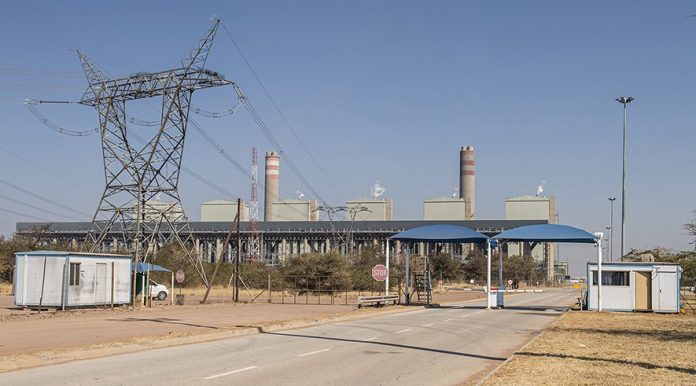March 1 next year marks 100 years since Eskom was founded. Its centenary year will find an organization on its knees, with the governing ANC solely to blame for the morass the once globally respect organisation finds itself in – struggling to power homes and industry.
Coincidentally, it was in the lead-up to the ANC’s 2007 elective conference in Polokwane that the country first experienced power cuts – what we now accept as loadshedding.
Then ANC president Thabo Mbeki, who would go on to lose spectacularly to Jacob Zuma that December, told an ANC fundraising gala dinner that “Eskom was right, government was wrong”.
Mbeki was correct, the 2007 blackouts that never really left us are a cocktail of numerous own goals by the ANC, coupled with unbridled corruption.
In 1997, Eskom was voted the best entity in corporate governance. Four years later, the company won the Financial Times Global Energy Award for Power Company of the Year at the awards ceremony in New York.
In 2004, the company would be awarded the Grand Prix award for uplifting the lives of South Africans.
The company’s financial performance was exceptional. Its balance sheet as of March 31 2005 reflects a debt/equity ratio of 0,18, making Eskom virtually debt free.
Not to forget the little matter of a credit rating agency, which in 2001 gave Eskom a rating above the sovereign.
Today, Eskom is widely accepted as being the biggest single threat to the nation’s economy and sovereign debt.
Taxpayers have had to bail out the entity on several occasions as it struggles with a debt pile of nearly R400-billion. Remember that in 2005, the company was literally debt free. With a defocused political leadership, it was a matter of time before the wheels came off at Eskom.
The new democratic government was facing a litany of challenges in 1994, mainly to reform the energy policy. The top priority was to address the past inequities of energy service provision. And much success was scored on this front.
The democratic government had inherited a well-oiled machine. For example, between 1961 and 1991, the utility had completed 14 new power stations with an installed capacity of 35 804 megawatts (MW). However, between 1991 and 2021, the power producer only completed one new power station, Majuba, with an installed capacity of 4 110MW.
The less said about Medupi and Kusile the better. The two stations, whose construction began in 2007, remain the poster child of corruption and betrayal to the country’s energy security.
Deputy President David Mabuza early this year told legislators that the design defects at the two power stations will only be concluded by the end of 2027.
Four years before the disastrous construction of Medupi and Kusile, the warning signs were already there that the country would be plunged into darkness.
Eskom’s board in the early 2000s decided to return three power stations to service: Camden, Grootvlei and Komati. This as peak demand jumped from 31 928 MW in 2003 to 34 195 MW in 2004.
Former statistician-general Pali Lehohla said that back in the 1980s, Eskom had so much power in terms of generating electricity.
“When the new government took over, it came in that aura of limitless energy that was provided by Eskom. In 1998, when the white paper was discussed on maintaining the energy flow in the country, the government ignored the advice of the engineers to build capacity in terms of power stations. Even president Thabo Mbeki conceded on that failure to listen to the engineers’ advice,” Lehohla said.
“This is a massive build up and we do not even know who should account to this. It’s not surprising to see where Medupi and Kusile are right now. There is a lot of loss between 2017 and 2022, as Eskom couldn’t even solve the problem during the Covid-19 pandemic, and that was when the use of energy was low as many people were working offline.
“Many businesses are suffering while jobs are being shed due to the energy crisis, and this shows that something was fundamentally wrong. This crisis goes back to the ruling party [ANC] as the whole system collapsed under its watch. Who would you say messed up in that regard, while the government leadership saw the collapse happening in front of it?” Lehohla asked.
Former minister of finance Tito Mboweni said: “Don’t crack your head about the white paper or green paper, etc. This is a technical matter. Do we have the technical capacity to provide energy for a more grown-up economy?
“Absolutely not, and that’s the issue. If we don’t have that capacity, we must ask ourselves how we look into the future, and we need to humble ourselves and accept that there are certain skills that we don’t have in South Africa to
power the economy. Therefore, we must go globally to look for those skills.
“The Eskom issues can be solved, but the biggest issue for South Africa is the combination of different sources of power, which is coal, nuclear, wind, hydro and others. In those sources of energy, you bring public and private sectors to work together to solve our issues.”
Follow @SundayWorldZA on Twitter and @sundayworldza on Instagram, or like our Facebook Page, Sunday World, by clicking here for the latest breaking news in South Africa. To Subscribe to Sunday World, click here.




